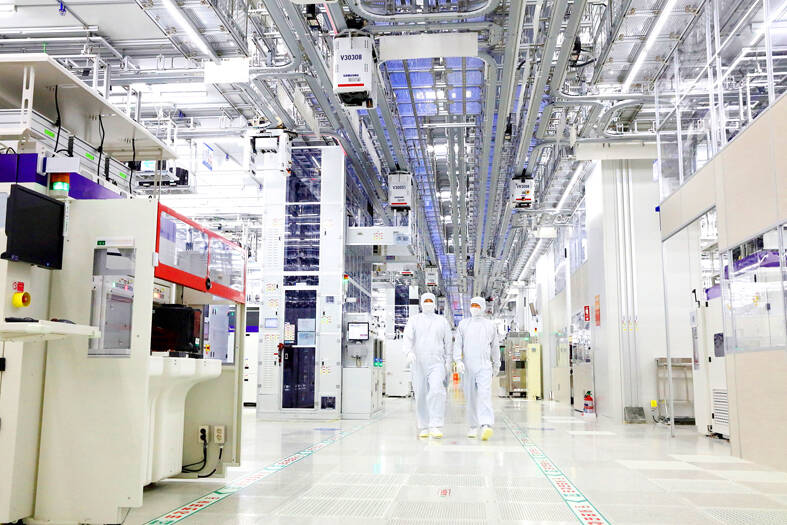Samsung Electronics Co has delayed mass production plans at its new chip plant in Taylor, Texas, the Korea Economic Daily reported, potentially dealing another blow to the administration of US President Joe Biden’s ambition to increase domestic semiconductor supplies.
Mass production at the upcoming US$17 billion fab would begin in 2025, the newspaper reported, citing a speech by Samsung foundry business president Choi Si-young at an industry event in San Francisco.
Samsung previously said the factory would start production in the second half of next year when it announced the investment in 2021. A spokesperson said the company cannot confirm the mass production schedule.

Photo: Samsung Electronics / Handout via Reuters
The report followed an earlier decision by Samsung’s bigger rival, Taiwan Semiconductor Manufacturing Co (TSMC, 台積電), to postpone production at its new Arizona fab to 2025 from next year due to a shortage of experienced construction workers and machine installation technicians.
Any delay at the US sites operated by the world’s two leading contract chipmakers would be a setback to Biden’s grand plan to boost chip production on US soil to avoid future supply disruptions like the 2021 shortage that cost companies hundreds of billions in revenue.
Revisions to TSMC’s and Samsung’s plans would mean their new plants, worth tens of billions of US dollars, might only come online after the US presidential election next year.
US environmental permit issues and the Biden administration’s slowness in delivering financial support have been plaguing domestic chip projects.
More than a year after Biden signed the CHIPS and Science Act into law, promising US$100 billion in support to new semiconductor plants in the US, his government has made one grant of only US$35 million to the US subsidiary of British aerospace firm BAE Systems PLC.

Meta Platforms Inc offered US$100 million bonuses to OpenAI employees in an unsuccessful bid to poach the ChatGPT maker’s talent and strengthen its own generative artificial intelligence (AI) teams, OpenAI CEO Sam Altman has said. Facebook’s parent company — a competitor of OpenAI — also offered “giant” annual salaries exceeding US$100 million to OpenAI staffers, Altman said in an interview on the Uncapped with Jack Altman podcast released on Tuesday. “It is crazy,” Sam Altman told his brother Jack in the interview. “I’m really happy that at least so far none of our best people have decided to take them

BYPASSING CHINA TARIFFS: In the first five months of this year, Foxconn sent US$4.4bn of iPhones to the US from India, compared with US$3.7bn in the whole of last year Nearly all the iPhones exported by Foxconn Technology Group (富士康科技集團) from India went to the US between March and last month, customs data showed, far above last year’s average of 50 percent and a clear sign of Apple Inc’s efforts to bypass high US tariffs imposed on China. The numbers, being reported by Reuters for the first time, show that Apple has realigned its India exports to almost exclusively serve the US market, when previously the devices were more widely distributed to nations including the Netherlands and the Czech Republic. During March to last month, Foxconn, known as Hon Hai Precision Industry

PLANS: MSI is also planning to upgrade its service center in the Netherlands Micro-Star International Co (MSI, 微星) yesterday said it plans to set up a server assembly line at its Poland service center this year at the earliest. The computer and peripherals manufacturer expects that the new server assembly line would shorten transportation times in shipments to European countries, a company spokesperson told the Taipei Times by telephone. MSI manufactures motherboards, graphics cards, notebook computers, servers, optical storage devices and communication devices. The company operates plants in Taiwan and China, and runs a global network of service centers. The company is also considering upgrading its service center in the Netherlands into a

Taiwan’s property market is entering a freeze, with mortgage activity across the nation’s six largest cities plummeting in the first quarter, H&B Realty Co (住商不動產) said yesterday, citing mounting pressure on housing demand amid tighter lending rules and regulatory curbs. Mortgage applications in Taipei, New Taipei City, Taoyuan, Taichung, Tainan and Kaohsiung totaled 28,078 from January to March, a sharp 36.3 percent decline from 44,082 in the same period last year, the nation’s largest real-estate brokerage by franchise said, citing data from the Joint Credit Information Center (JCIC, 聯徵中心). “The simultaneous decline across all six cities reflects just how drastically the market